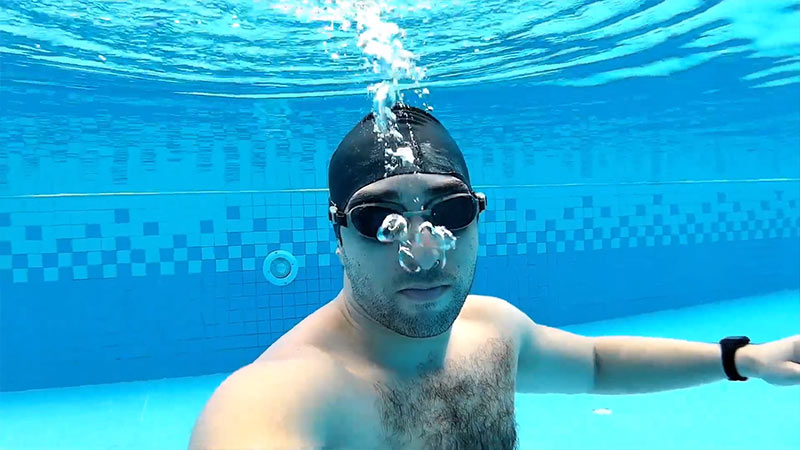Head discomfort underwater is a common yet unsettling experience for many divers. This discomfort can range from mild pressure sensations to more severe pains.
Several factors contribute to these sensations, including changes in water pressure, sinus and ear issues, and equipment-related factors. Understanding and addressing these issues is of paramount importance to ensure the safety and enjoyment of diving adventures.
Neglecting head discomfort can lead to ear or sinus barotrauma, affecting one’s overall diving experience and potentially causing injury.
In this discussion, we will delve into the reasons behind head discomfort during underwater activities and explore effective strategies for prevention and relief.
Understanding Water Pressure
Water pressure is crucial for anyone venturing underwater, especially for divers exploring the depths of the ocean. Water, being around 800 times denser than air, exerts a significant force as you descend into its depths.
This force increases with depth due to the weight of the water column above you, creating what’s known as hydrostatic pressure. To navigate these pressure changes safely, divers need a solid grasp of these concepts.
Moreover, knowing how to measure water pressure in units like atmospheres (ATM) or pounds per square inch (PSI) allows divers to quantify the intensity of the pressure they experience underwater.
This knowledge aids in planning and executing dives effectively, ensuring that the human body can adapt to the changing conditions as it descends into the mesmerizing underwater world.
Why Does My Head Hurt When I Go Deep Underwater?
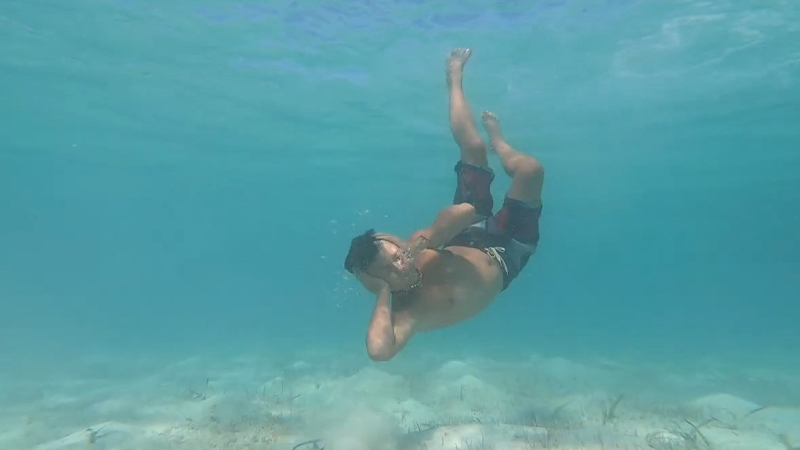
The sensation of head discomfort or pain when going deep underwater is primarily due to the changes in water pressure experienced as you descend into deeper parts of the water. This phenomenon is known as “barotrauma,” and it can affect various parts of your head, particularly your ears and sinuses.
Ear Barotrauma
The most common cause of head discomfort when diving is ear barotrauma. As you descend into the water, the water pressure increases, compressing the air spaces in your ears.
The Eustachian tubes, which connect your middle ear to the back of your throat, help equalize the pressure on both sides of your eardrum.
However, if the pressure changes too rapidly or if these tubes are not functioning correctly, it can lead to a feeling of pressure or pain in your ears. This sensation is similar to the “popping” you might experience when flying in an airplane or ascending/descending in an elevator.
Sinus Barotrauma
Another type of barotrauma that can cause head discomfort is sinus barotrauma. Your sinuses are air-filled cavities in your skull, and as you descend underwater, the increased pressure can affect these cavities.
If your sinuses are congested or blocked, it can be challenging for the pressure to equalize, leading to pain and discomfort in your forehead, cheeks, or around your eyes.
Equipment and Seal
Another factor to consider is the equipment you use while diving. Diving masks and goggles play a crucial role in maintaining a barrier between your eyes and the surrounding water.
If these seals are not airtight or if water manages to seep in, it can cause pressure-related discomfort and even headaches. Ensuring that your diving gear is well-fitted and functioning correctly is essential to prevent these issues.
To mitigate the discomfort and prevent more severe barotrauma injuries, divers can employ several strategies. These include:
- Equalization Techniques: Practicing equalization techniques helps your ears and sinuses adjust to the changing pressure. Methods such as swallowing, yawning, or gently blowing against a closed nose can facilitate air movement and alleviate discomfort.
- Proper Equipment: Investing in high-quality, well-fitted diving gear, including masks and earplugs designed for diving, can help maintain a secure seal and prevent water intrusion.
- Descent Speed: Gradual descents give your body more time to adapt to increasing pressure. Rushing into deeper waters can exacerbate discomfort.
- Sinus and Ear Health: Ensuring your sinuses and ears are healthy before diving is crucial. If you have congestion or ear infections, it’s advisable to postpone your dive until you’ve fully recovered.
Strategies for a Pain-free Dive
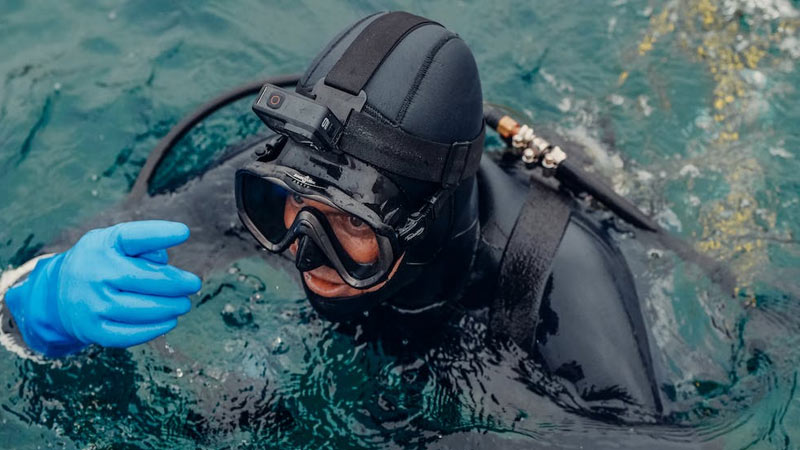
Diving into the mesmerizing underwater world is a thrilling adventure, but discomfort or pain due to changes in water pressure can dampen the experience. To ensure a pain-free and enjoyable dive, divers can employ several effective strategies:
1. Gradual Descent
One of the fundamental principles of diving is to descend gradually. Avoid rushing into the depths, as this can increase the rate at which water pressure changes. Slow and controlled descents allow your body more time to adapt, reducing the risk of discomfort.
2. Equalization Techniques
Practicing proper equalization techniques is vital for maintaining ear and sinus health. Techniques like swallowing, yawning, or gently blowing against a closed nose help equalize the pressure in your ears and sinuses. Begin equalizing early and continue regularly during your descent.
3. Well-Fitted Diving Gear
Ensure that your diving equipment, including masks, goggles, and wetsuits, is well-fitted and in good condition. A properly sealed mask or goggles prevents water from seeping in and causing pressure-related discomfort.
4. Equalizing Ear and Sinus Health
Prior to your dive, ensure that your ears and sinuses are in good health. If you have sinus congestion, a cold, or an ear infection, it’s best to postpone your dive until you’ve fully recovered. Consult with a healthcare professional if needed.
5. Descend Feet First
Descending feet first is a recommended practice, as it allows for easier equalization of ear and sinus pressure. This position enables air to escape more readily from these areas.
6. Maintain a Relaxed State
Stress and anxiety can exacerbate discomfort during a dive. Staying calm and relaxed is essential. Take slow, deep breaths to maintain composure and reduce tension.
7. Communication with Dive Buddy
Diving with a buddy is not only a safety measure but also ensures you have someone to communicate with underwater. If you experience discomfort or pain, signal your buddy immediately, so they can assist or alert the dive leader.
8. Monitor Depth and Pressure
Keep an eye on your depth gauge and pressure gauge (if applicable) to be aware of your current depth and pressure conditions. This information can help you adjust your descent or ascent as needed.
9. Dive within Your Limits
Understand your personal limitations and do not push yourself beyond your comfort zone. Diving deeper than your experience level or physical condition allows can increase the risk of discomfort and injury.
10. Seek Professional Guidance
If you frequently experience discomfort during dives or if you’re new to diving, consider taking a diving course or seeking guidance from experienced divers. They can provide valuable tips and insights to enhance your diving experience.
How Do I Clear My Sinuses for Diving?
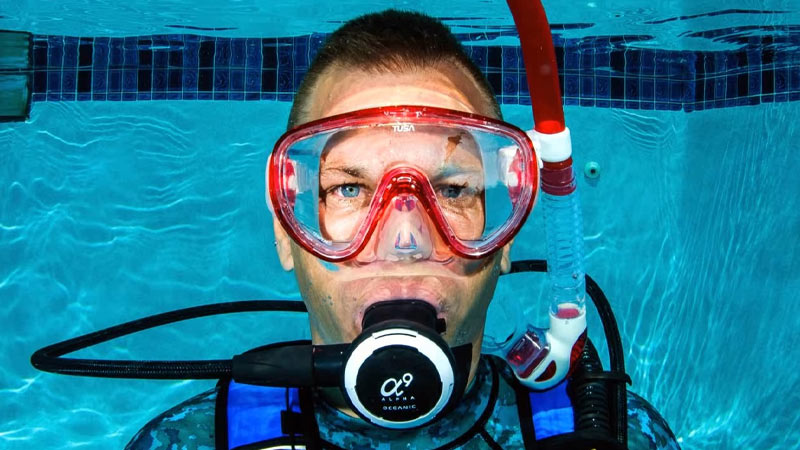
Clearing your sinuses before diving is essential for a comfortable and safe underwater experience. Here are steps to help you clear your sinuses before diving:
Stay Hydrated
Proper hydration is crucial before any dive. Drinking plenty of water helps keep mucus thin and makes it easier to clear your sinuses.
Nasal Rinse or Saline Spray
Consider using a saline nasal rinse or spray. These products help flush out mucus and irritants from your nasal passages, reducing congestion.
Decongestants (Consult a Doctor)
If you have mild sinus congestion, an over-the-counter decongestant may help. However, it’s essential to consult with a healthcare professional before using any medication, especially if you have any underlying health conditions or are taking other medications.
Steam Inhalation
Inhaling steam can help loosen mucus and relieve congestion. You can do this by leaning over a bowl of hot water and covering your head with a towel to trap the steam. Breathe deeply for a few minutes.
Avoid Allergens and Irritants
If you have known allergies, try to avoid allergens that may exacerbate your sinus congestion. Additionally, avoid exposure to smoke or other irritants that can worsen congestion.
Rest and Sleep
Adequate rest can help your body recover and reduce congestion. Ensure you get a good night’s sleep before your dive.
Avoid Alcohol and Smoking
Both alcohol and smoking can exacerbate sinus congestion. It’s advisable to avoid these substances before diving.
Consult a Healthcare Professional
If you have chronic or severe sinus issues, or if you’re unsure about your sinus health, consult a healthcare professional or an ear, nose, and throat specialist. They can provide personalized advice and treatment options.
Allow Sufficient Time
Give yourself ample time to clear your sinuses before the dive. Rushing the process can lead to discomfort and potential ear barotrauma during the descent.
Practice Equalization Techniques
Familiarize yourself with equalization techniques for your ears and sinuses. During your dive, continue to equalize regularly to prevent congestion-related discomfort.
How do you relieve ear pressure underwater?
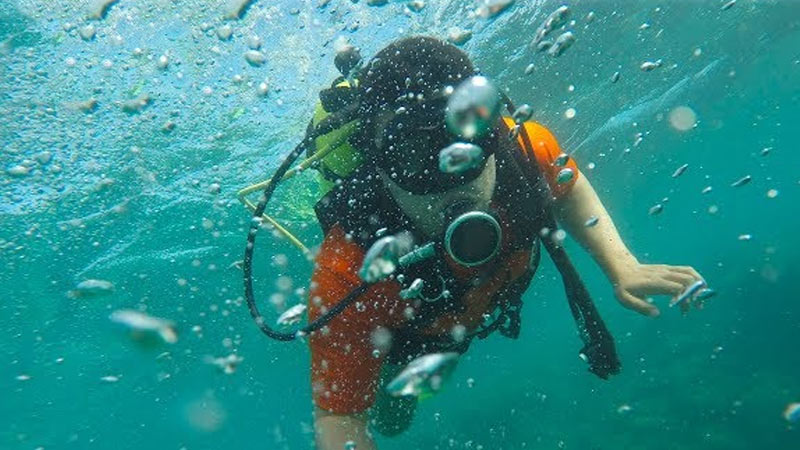
Relieving ear pressure underwater is essential to prevent ear barotrauma and ensure a comfortable and safe diving experience. Ear barotrauma occurs when there is a difference in pressure between the inside and outside of the ear, causing pain and potential injury. Here’s how you can relieve ear pressure while underwater:
Equalization Techniques
The most common and effective way to relieve ear pressure is by using equalization techniques. These methods help equalize the pressure between the middle ear and the surrounding water. The two primary equalization techniques are:
- Valsalva Maneuver: Pinch your nostrils shut and gently blow through your closed nostrils. This action forces air into the Eustachian tubes, equalizing the pressure in your middle ear.
- Toynbee Maneuver: Pinch your nostrils shut and swallow. This technique also helps open the Eustachian tubes and equalize ear pressure.
Frenzel Maneuver
This technique is often used by experienced divers and involves pinching the nostrils shut and making a “k” sound in the back of the throat while moving the tongue upward. The Frenzel maneuver requires some practice to master but can be very effective for equalization.
Descend Feet First
Descending feet first rather than head first can aid in equalizing ear pressure. This position allows air to escape more readily from the Eustachian tubes.
Equalize Early and Often
Begin equalizing your ears as soon as you start your descent and continue to do so frequently. Waiting until you feel discomfort or pain can make equalization more challenging.
Stay Relaxed
Tension and stress can affect your ability to equalize. Stay calm and relaxed, as this can make equalization easier.
Do Not Force It
If you are unable to equalize your ears despite your efforts, do not force it. Ascend slightly until you can successfully equalize. Forcing can lead to ear barotrauma.
Check for Ear Issues
Before diving, ensure your ears are in good health. If you have a cold, sinus congestion, or an ear infection, it’s best to postpone your dive until you’ve fully recovered.
Consult with an Instructor
If you are new to diving or experiencing persistent issues with ear equalization, consider seeking guidance from a certified diving instructor. They can provide personalized tips and guidance.
What Happens When You Swim Too Deep?
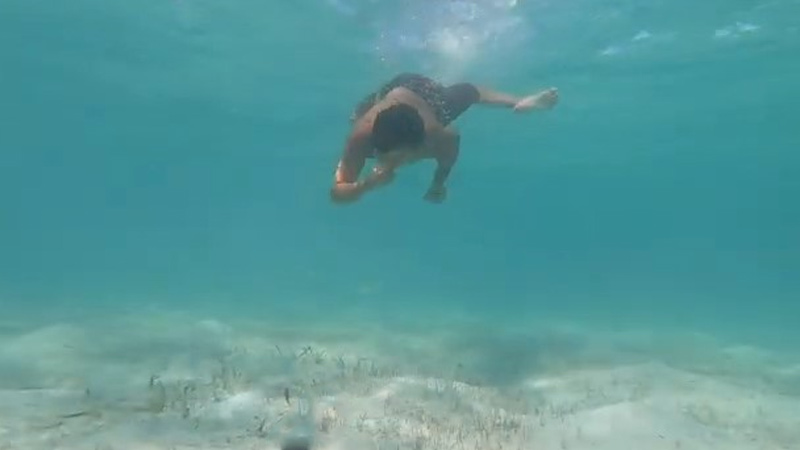
Swimming too deep, especially without the appropriate training and equipment, can pose significant risks and dangers. The effects of swimming too deep can vary depending on several factors, including the depth, the duration of the dive, and the individual’s experience and physical condition. Here are some potential consequences of swimming too deep:
Pressure-Related Issues
As you descend deeper underwater, the water pressure increases. This can lead to pressure-related problems, such as ear barotrauma, sinus barotrauma, and even lung barotrauma if you hold your breath while ascending. These conditions can cause pain, discomfort, and in severe cases, injury.
Gas Narcosis (Nitrogen Narcosis)
When diving to greater depths, divers may experience nitrogen narcosis, also known as “rapture of the deep.” This condition occurs because the increased pressure causes nitrogen in the breathing gas to affect the nervous system.
Symptoms can include confusion, impaired judgment, and a feeling of euphoria, similar to alcohol intoxication. It can impair a diver’s ability to make safe decisions.
Decompression Sickness (The Bends)
Swimming too deep for too long can result in the accumulation of nitrogen in the body tissues. If a diver ascends too quickly without proper decompression stops, this excess nitrogen can form bubbles in the bloodstream, leading to decompression sickness. Symptoms can range from joint pain and rashes to paralysis and death in severe cases.
Oxygen Toxicity
At extreme depths, there is a risk of oxygen toxicity, particularly when using mixed gases like nitrox or trimix. Breathing high levels of oxygen under pressure can lead to seizures and other neurological symptoms.
Limited Bottom Time
As you descend deeper, the pressure increases, and the amount of time you can safely spend at that depth decreases. This means that you may have limited time to explore or complete your dive objectives before needing to ascend to shallower depths.
Cold and Darkness
Deeper waters are often colder and darker, which can increase the risk of hypothermia and disorientation. It’s essential to have appropriate exposure protection and adequate lighting when diving deep.
Increased Air Consumption
Deeper dives typically require more air due to the increased pressure. Running out of air while deep underwater can be life-threatening.
Navigational Challenges
Deep dives can be challenging to navigate, especially if visibility is reduced. Getting lost or disoriented underwater is a real danger.
FAQs
How does water temperature affect my diving experience?
Water temperature can significantly impact your diving experience. Colder water may require thicker wetsuits or drysuits to stay comfortable, while warmer water may allow for thinner exposure protection. Temperature can also influence the marine life you encounter, as different species thrive in different temperature ranges.
What is “narcosis,” and how does it affect divers?
Narcosis, or nitrogen narcosis, is often referred to as the “rapture of the deep.” It occurs when divers breathe nitrogen at greater depths, leading to impaired judgment and cognitive function. Divers might feel euphoric or confused. It’s a reversible condition that improves upon ascending to shallower depths.
Are there any special considerations for night diving?
Night diving introduces unique challenges, such as limited visibility and the need for specialized lighting equipment. Divers also need to be cautious about disturbing nocturnal marine life and should have training specific to night diving.
How can I deal with seasickness while diving from a boat?
Seasickness can be a concern for some divers. Remedies include staying hydrated, focusing on the horizon, and taking over-the-counter medications or using wristbands designed to alleviate motion sickness. Properly preparing and pacing yourself during dives can also help.
To Recap
The experience of head discomfort underwater is a significant concern for divers, but armed with knowledge and proper techniques, it can be effectively managed.
The underwater world is a captivating realm filled with wonders, and addressing head discomfort is vital to fully appreciate its beauty.
By understanding the factors contributing to this sensation, such as changes in pressure, ear and sinus issues, and equipment-related concerns, divers can take proactive measures to mitigate the risks.
Remember that safe and enjoyable diving hinges on equalization, gradual descents, well-fitted gear, and maintaining good ear and sinus health.
Ultimately, embracing these strategies ensures that the underwater journey is both pain-free and unforgettable.

